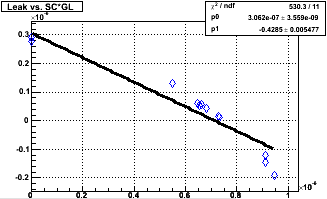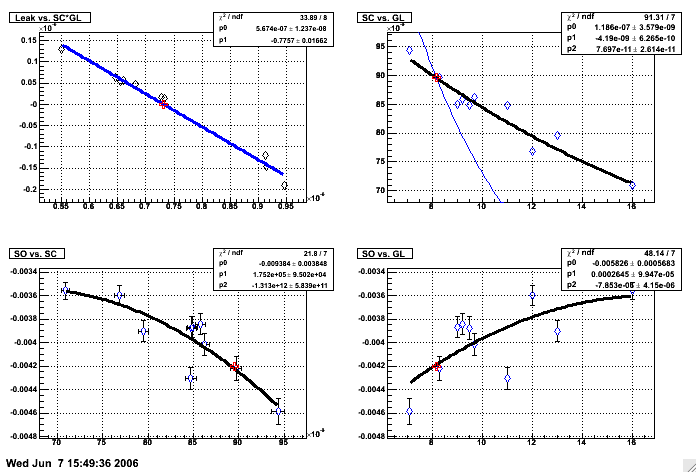Do you find the S&C internal group meeting useful ?
Yes
57% (4 votes)
No
0% (0 votes)
Somewhat
43% (3 votes)
Total votes: 7
pp2006: longitudinal polarization
Updated on Mon, 2006-06-12 14:29. Originally created by genevb on 2006-05-30 10:48. Under: Using the calibration technique described SpaceCharge and GridLeak Calibration How-To Guide, I made several passes on data from the longitudinal polarization running. This was the first dataset from the 2006 running which I calibrated, and there were a few items to note during this calibration process:
Excluding the no-correction data, here are the plots and output from my final iterative pass (after enough iterations to stabilize the fits):
- No beamline constraint was yet available while I did the calibration. Instead, a beamline fixed to the z-axis was used. This should bias the vertex positions, but as long as tracks used in this calibration come from all azimuth angles, there should only be a smearing of the DCA distributions, not a bias.
- Distortions were larger than ever before, so histogram ranges needed expanding.
- Spread in the measures of the GridLeakage and SpaceCharge ionization were larger than I found when calibrating CuCu22 from last year, so I had to open the cuts used in the Calib_SC_GL.C macro (from 0.005 and 0.0003 respectively for CuCU22, to 0.015 and 0.0015 for this data). The SpaceCharge cut in particular had to be significantly widened. I though that this might be because of the uncalibrated beamline constraint, which introduces a smearing of a few mm into the primary vertex DCA distribution used to determine SpaceCharge, but a later test using the beamline constraint did not significantly narrow this distribution.
- For the first pass of this calibration, I used Fast Offline data which had no SpaceCharge and GridLeak corrections. While the first pass was somewhat useful to suggest where to start with SpaceCharge and GridLeak
correction parameters, I had to remove the first pass data points from the eventual iterative pass fits
because the distortion is so strong that without correction we actually lose tracks with large GridLeak gaps,
biasing our measure of the distortion. This can be seen in the following plot of measured distortion gap versus
the amount of GridLeak correction used (as expressed by SC*GL), where the no-correction points significantly
alter the straight-line fit:

It may also be true that the StMagUtilities code used to correlate distortions to the ionization has issues when the GridLeak gap is large. Work is in progress to improve this particular code.
Excluding the no-correction data, here are the plots and output from my final iterative pass (after enough iterations to stabilize the fits):
* Constraint on SC x GL = 7.31e-07
* Guesses on SC = 8.9e-08 , 3.95e-08 , 8.96e-08 , 3.95e-08
* Guesses on SO = 4.68e+04 , 4.72e+04
*** FINAL CALIBRATION VALUES: ***
SC = 8.96e-08 * ((zdce+zdcw) - (4.7e+04)) with GL = 8.2Useful Documents
Updated on Mon, 2008-08-18 22:11. Originally created by balewski on 2006-05-30 02:56. Under: A full list of attached documents is available below, but I wanted to highlight a few here:
BEMC Technical Design Report (PDF)
"Real Multiplicity" mixing for pion-kaon
Updated on Fri, 2006-05-26 04:57. Originally created by kisiel on 2006-05-26 04:57.Reference
Speaker : Adam Kisiel ( Warsaw University of Technology )
Talk time : 15:40, Duration : 00:10
Shutdown schedule
Updated on Thu, 2006-06-15 09:52. Originally created by rlbrown on 2006-05-25 09:34. Under:FY06
Updated on Wed, 2006-06-28 08:56. Originally created by rlbrown on 2006-05-25 09:34. Under:STAR FY06 Shutdown Schedule
Project Start Date: 6/26/06
Project Finish Date: 10/27/06
STAR Technical Support Group
Updated on Sun, 2008-07-06 15:02 by testadmin. Originally created by rlbrown on 2006-05-25 09:27. Under:On this site you'll be able to:
- See the latest shutdown schedule for the STAR Detector
- Search STAR Mechanical Drawings Database and view the actual
Proton femtoscopy- paper proposal
Updated on Thu, 2006-05-25 08:02. Originally created by hbtuser on 2006-05-25 08:02.Reference
Speaker : Hania Gos, Adam Kisiel ( Warsaw University Of Technology, SUBATECH )
Talk time : 15:30, Duration : 00:10
AOB
Updated on Wed, 2006-05-24 10:26. Originally created by testadmin on 2006-05-24 10:26.Speaker : All
Talk time : 12:50, Duration : 00:10
p+p Spin PWG analysis QA overview
Updated on Wed, 2006-05-24 10:33. Originally created by testadmin on 2006-05-24 10:25.Speaker : Jim Sowinsky ( IUCF )
Talk time : 12:40, Duration : 00:10
E-EMC status and timeline for readiness for Y6 p+p
Updated on Wed, 2006-05-24 11:14. Originally created by balewski on 2006-05-24 10:25.Speaker : Jan Balewski ( IUCF )
Talk time : 12:30, Duration : 00:10
B-EMC calibration readiness for p+p
Updated on Wed, 2006-05-24 11:24. Originally created by kocolosk on 2006-05-24 10:24.Speaker : Adam Kocoloski ( MIT )
Talk time : 12:20, Duration : 00:10
1) SMD/PSD pedestals - we have a student analyzing these. Shouldn't be a problem to have the tables ready for zero-suppressing during production.
2) Tower status tables - goal is to get preliminary, "broad brush" status tables ready. We're in a transition period here and we haven't yet named a new person to do the final status tables for 2006. I contacted one of our newer students the other day; hopefully we can get this task assigned soon.
Calibration status overview for TPC, p+p
Updated on Wed, 2006-05-24 10:51. Originally created by testadmin on 2006-05-24 10:23.Speaker : Gene Van Buren ( BNL )
Talk time : 12:10, Duration : 00:10
BeamLine Constraint
- Chain has been developed and tested
- Useful triggers have been identified
- File list to process has been created
- Will process through Tuesday, 16th of May initially to confirm it is going well
- Will then process through today
- Still some possibility for automating this through the end of the run
- Processing in progress; should be finished with part 1 within a day or so
SpaceCharge & GridLeak
- Calibrations using the ppProductionLong dataset from the past couple weeks is underway
- Increased luminosity has made distortion larger than ever: now seeing primary vertex DCA distortions of close to 2cm!
- I have been calibrating without a BeamLine constraint, which should hypothetically only smear my DCAs, not bias them...but I want to be sure...
- Want to verify calibration of SpaceCharge & GridLeak with calibrated BeamLine before DB insertion; time estimate is end-of-this-week
- Will need to re-calibrate with different beam polarizations/energies
Short in TPC IFC East
- As Field Cage Shorts, there is a distortion due to an electrical short in the TPC IFC East
- The excess current has been slowly increasing over the past couple months, so Blair & I decided to increase the compensating resistance today to again reduce the distortion
- R&D still to be done on how to handle the non-constant excess current for a better calibration
Gene Van Buren
gene@bnl.gov
Status of the SVT review production
Updated on Wed, 2006-05-24 10:23. Originally created by testadmin on 2006-05-24 10:20.Speaker : Lidia Didenko ( BNL )
Talk time : 12:00, Duration : 00:10
Kapusta talk at UW
.
Joe Kapusta gave a nice UW physics colloqium today. It was mostly an overview of RHIC physics and current theoretical understandings of what appears to be happening in RHIC AuAu collision.
Joe Kapusta gave a nice UW physics colloqium today. It was mostly an overview of RHIC physics and current theoretical understandings of what appears to be happening in RHIC AuAu collision.
Enter TPC gains into database
Updated on Sat, 2006-05-20 16:46. Originally created by hjort on 2006-05-20 16:46. Under: The TPC gains file is usually found at
rts02.starp.bnl.gov:/RTS/conf/tpc_gains.txt
Somebody like Tonko or Blair usually announces when a new file has been created on the calib-hn list. To update the database get this file into your working directory. You will also need to get a file RowPadToFEE.txt from, e.g., /star/u/jecc/tpcwrk. Finally you need to run the macro that Fabrice Retiere wrote called MakeGainT0Y4Copy.C, available from, e.g., /star/u/jedd/tpcwrk/StRoot/macros. Usage of this macro is
rts02.starp.bnl.gov:/RTS/conf/tpc_gains.txt
Somebody like Tonko or Blair usually announces when a new file has been created on the calib-hn list. To update the database get this file into your working directory. You will also need to get a file RowPadToFEE.txt from, e.g., /star/u/jecc/tpcwrk. Finally you need to run the macro that Fabrice Retiere wrote called MakeGainT0Y4Copy.C, available from, e.g., /star/u/jedd/tpcwrk/StRoot/macros. Usage of this macro is
Miscellaneous TPC calibration notes
Updated on Sun, 2006-05-21 00:14. Originally created by hjort on 2006-05-20 13:22. Under: The log file for automated drift velocity calculations is at ~starreco/AutoCalib.log.
Log files for fast offline production are at /star/rcf/prodlog/dev/log/daq.
The CVS area for TPC calibration related scripts, macros, etc., is StRoot/macros/calib.
Log files for fast offline production are at /star/rcf/prodlog/dev/log/daq.
The CVS area for TPC calibration related scripts, macros, etc., is StRoot/macros/calib.
Drift velocity
Updated on Tue, 2016-02-09 11:33 by genevb. Originally created by hjort on 2006-05-19 00:57. Under:Below is some documentation for the current automated drift velocity calibration.
TPC survey instructions
Updated on Thu, 2013-08-29 17:38 by mstftsm. Originally created by hjort on 2006-05-19 00:46. Under: Survey results can be obtained from the STAR Technical Support Group:
http://www.bnl.gov/STAR/STSG/survey.asp
http://www.bnl.gov/STAR/STSG/survey.asp

